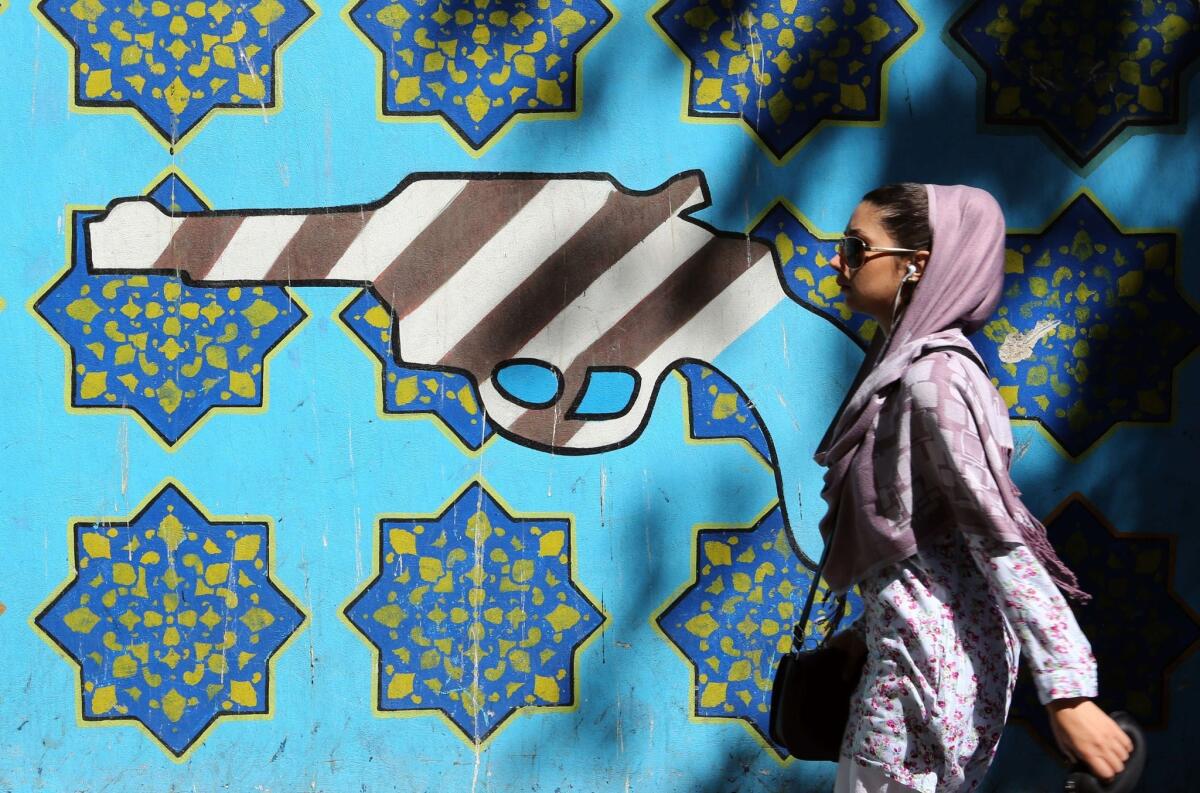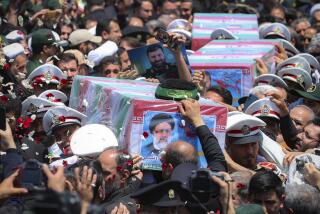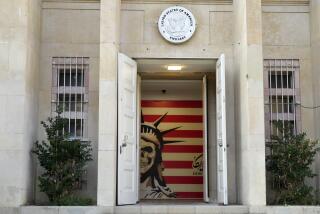One week later, ‘Death to U.S.A.’ chant back in vogue in Iran capital

- Share via
TEHRAN — The emblematic “Death to U.S.A” chant resounded through the Iranian capital anew on Friday, one week after it appeared that the signature slogan could be sidelined as part of a possible thaw in long-acrimonious relations between Iran and the United States.
At the formal Friday prayers ceremony, hard-line Ayatollah Ahmad Khatami labeled President Obama a “liar” and revived the “Death to U.S.A” mantra, whipping up worshipers with a series of denunciations of the “Great Satan,” another term he repeated with considerable relish.
“Americans have tried in the past 35 years to topple the Islamic system but failed,” Khatami told worshipers at the heavily choreographed Friday prayer ceremony, referring to the 1979 Islamic Revolution, which took place a year earlier according to the Persian calendar.
The handling of the “Death to U.S.A.” chant reflects the deep divisions within the Iranian establishment about the prospect of any kind of détente with Washington and the West.
Last week, in the aftermath of new President Hassan Rouhani’s conciliatory comments at the United Nations, the “Death to U.S.A.” chant was muted at Friday prayer proceedings. A prominent speaker last week even seemed to chide a worshiper who ventured a “Death to U.S.A.” declaration out of habit.
“Have I made any slogan that you are echoing?” the guest speaker, former culture minister Saffar Harandi, pointedly asked the crowd, and himself refrained from using the chant.
The message seemed to be that fanning the flames of anti-Americanism was off the official agenda as Iran pursued some kind of rapprochement with its longtime antagonist in Washington. The old reliable affirmation appeared to be moving into the realm of the politically incorrect, at least in moderate Iranian circles.
In fact, Faezeh Hashemi Rafsanjani, the controversial daughter of ex-president Ali Akbar Rasfanjani, a mentor of Rouhani’s, publicly suggested that “Death to U.S.A” could be deleted from official discourse — though, she cautioned, the national interest must be considered before such a weighty decision was taken.
However, in his sermon on Friday on the grounds of Tehran University, Ayatollah Khatami reinstated “Death to the U.S.A.” to its elevated stature, providing worshipers with historical perspective about the slogan’s origins and its importance to the late Ayatollah Ruhollah Khomeini, who headed the Islamic Revolution. The fiery Friday prayer leader was dismissive about any move toward moderating anti-U.S. invective.
In his final message to Muslim pilgrims before his death, Khomeini mentioned the U.S. no fewer than 46 times “with hatred,” Khatami stressed.
“The question is, has the United States in the last 35 years become less satanic?” Khatami asked. “No, but 35 times more satanic!”
Still, Khatami, reflecting the establishment view here, applauded the work of the Iranian diplomatic team in New York last month, even if some of their behavior in New York was, he said, “not appropriate.”
Iran’s supreme leader, Ayatollah Ali Khamenei, has likewise given his qualified endorsement to the new president’s conciliatory gestures to the West, while acknowledging some “not appropriate” moments. He was apparently referring in part to the visit’s signature event — a 15-minute telephone call that President Obama placed to Rouhani, the highest-level contact in more than three decades between the two nations.
The new Iranian foreign minister, Mohammad Javad Zarif, who accompanied President Rouhani to New York, revealed this week on his Facebook page that he briefly checked into a hospital because of back pains and muscle spasms apparently linked to hard-liner attacks against him in the Iranian press following the U.N. trip. The U.S.-educated Zarif has emerged as an engaged English-speaking advocate for the new Iranian leadership’s push for a rapprochement with the West and relief from crippling economic sanctions against the Islamic Republic.
ALSO:
OPCW wins Nobel Peace Prize; group struggling to disarm Syria
Report: Syrian rebels targeted civilians in Assad’s home province
Kerry makes urgent trip to Kabul as security pact deadline looms
Special correspondent Mostaghim reported from Tehran and staff writer McDonnell from Beirut.
More to Read
Sign up for Essential California
The most important California stories and recommendations in your inbox every morning.
You may occasionally receive promotional content from the Los Angeles Times.










